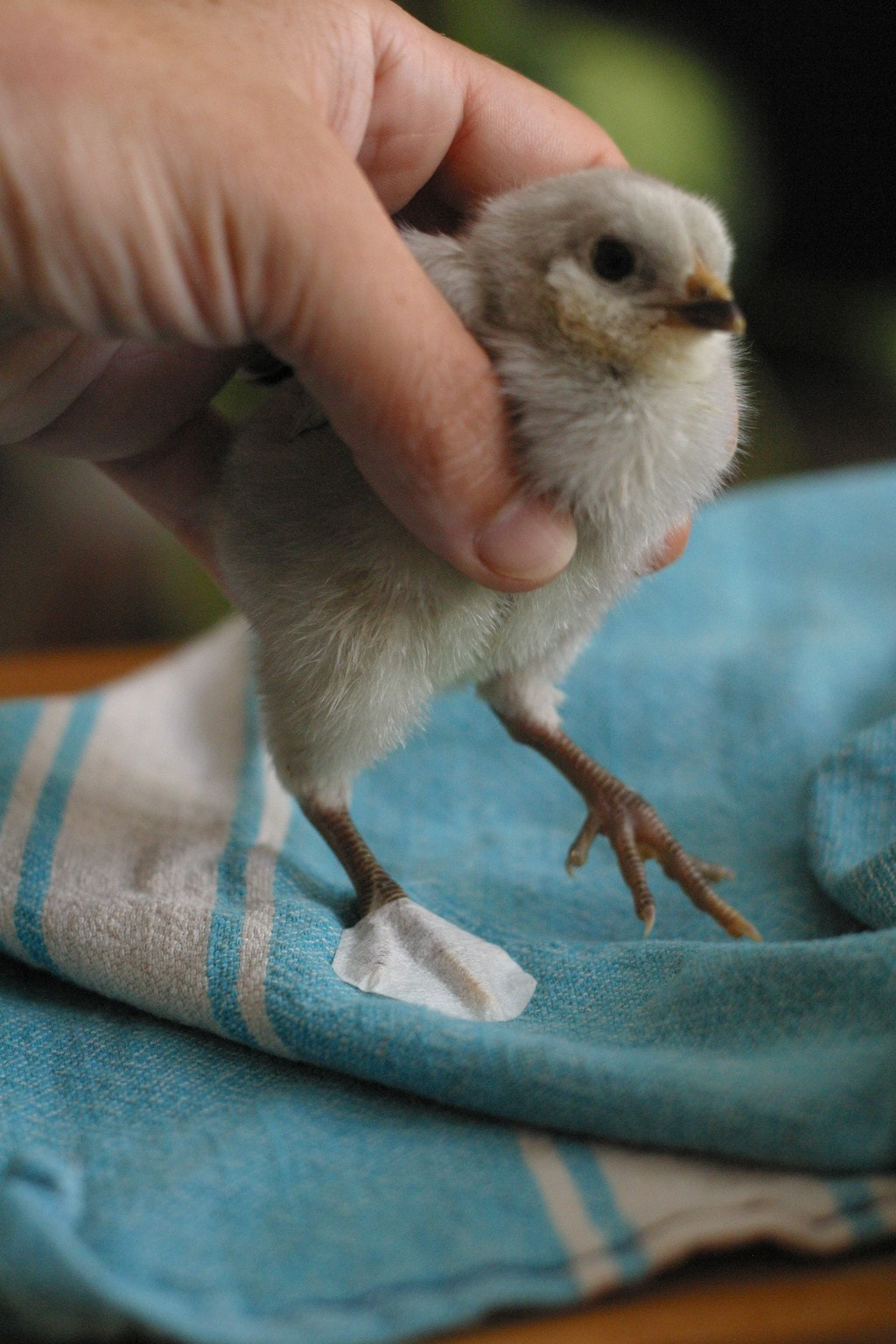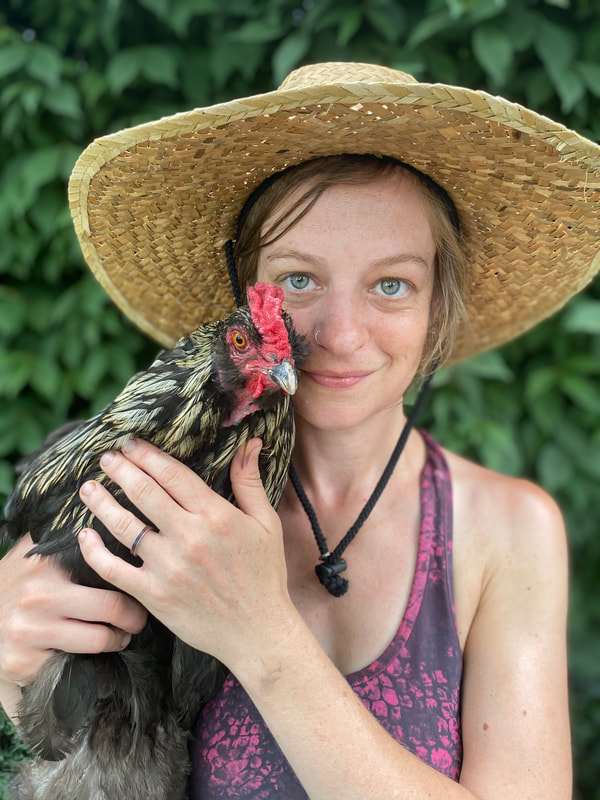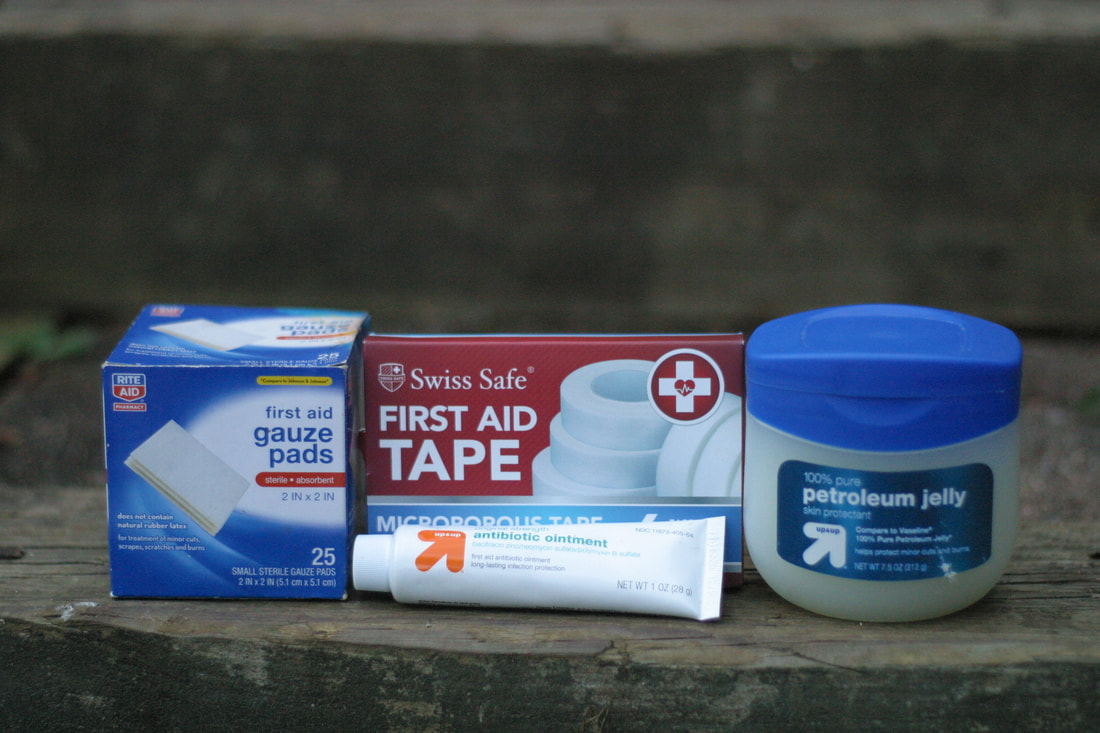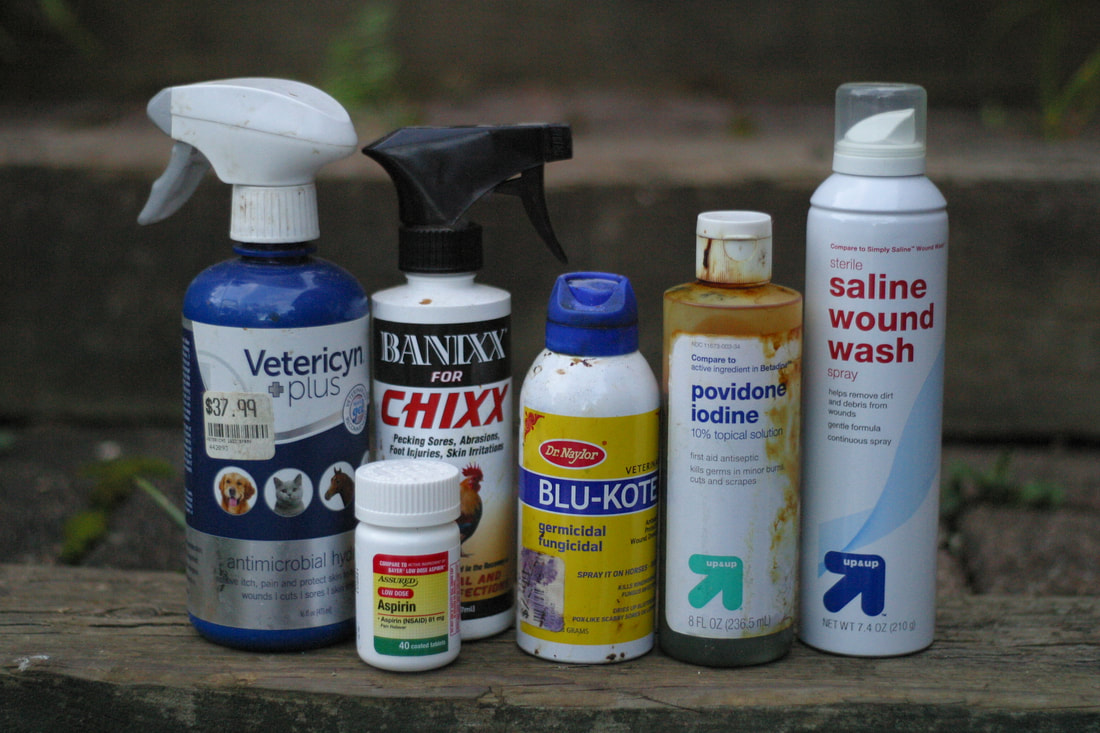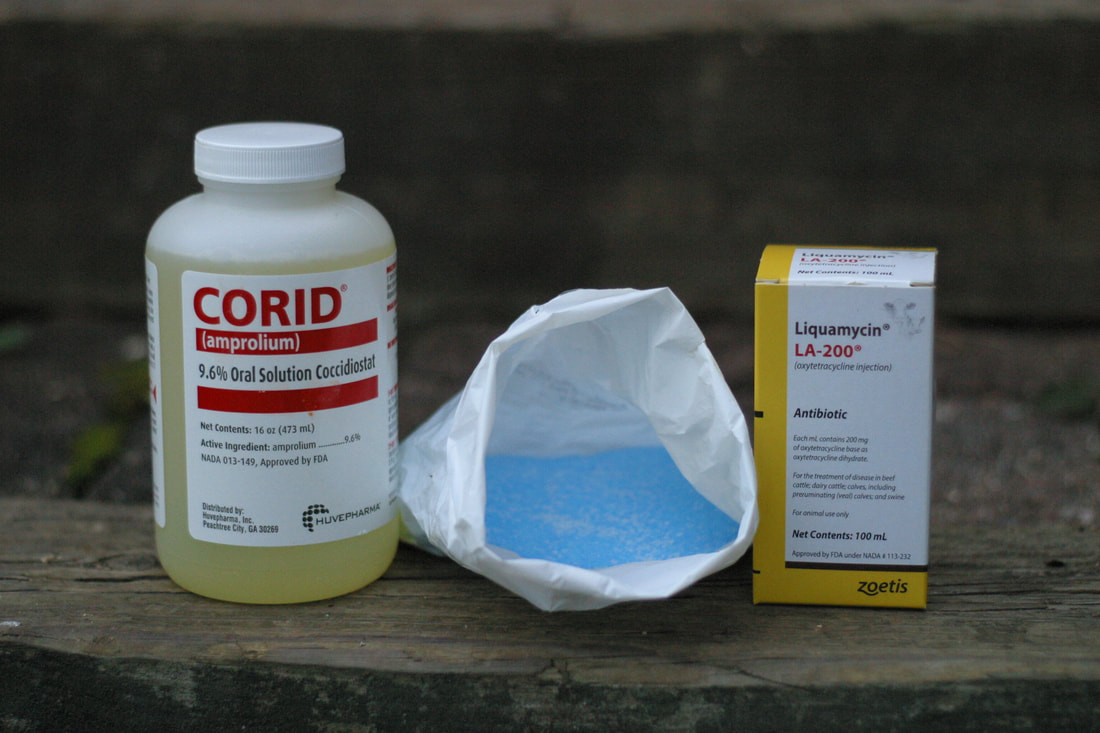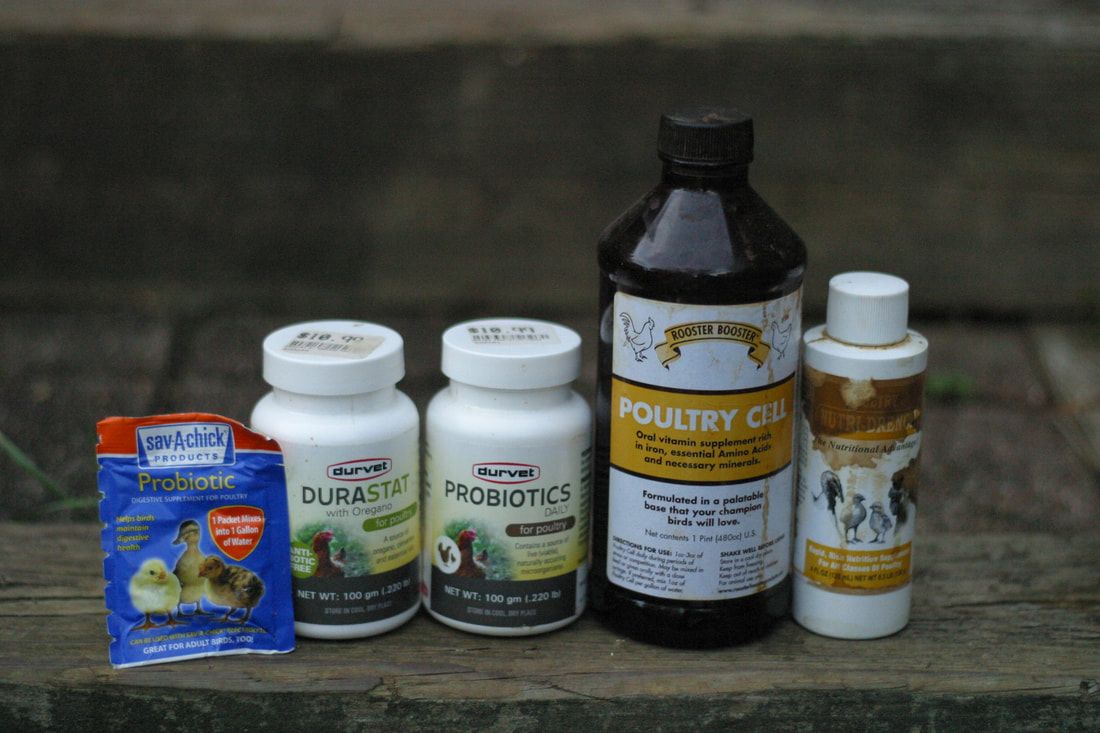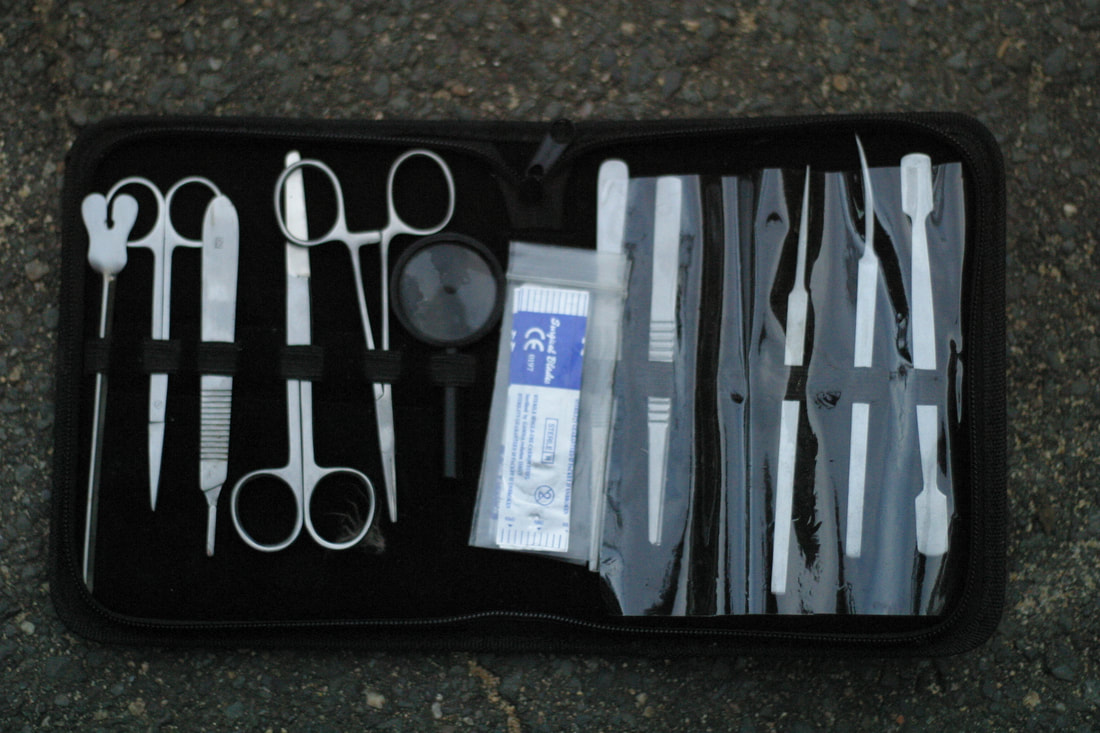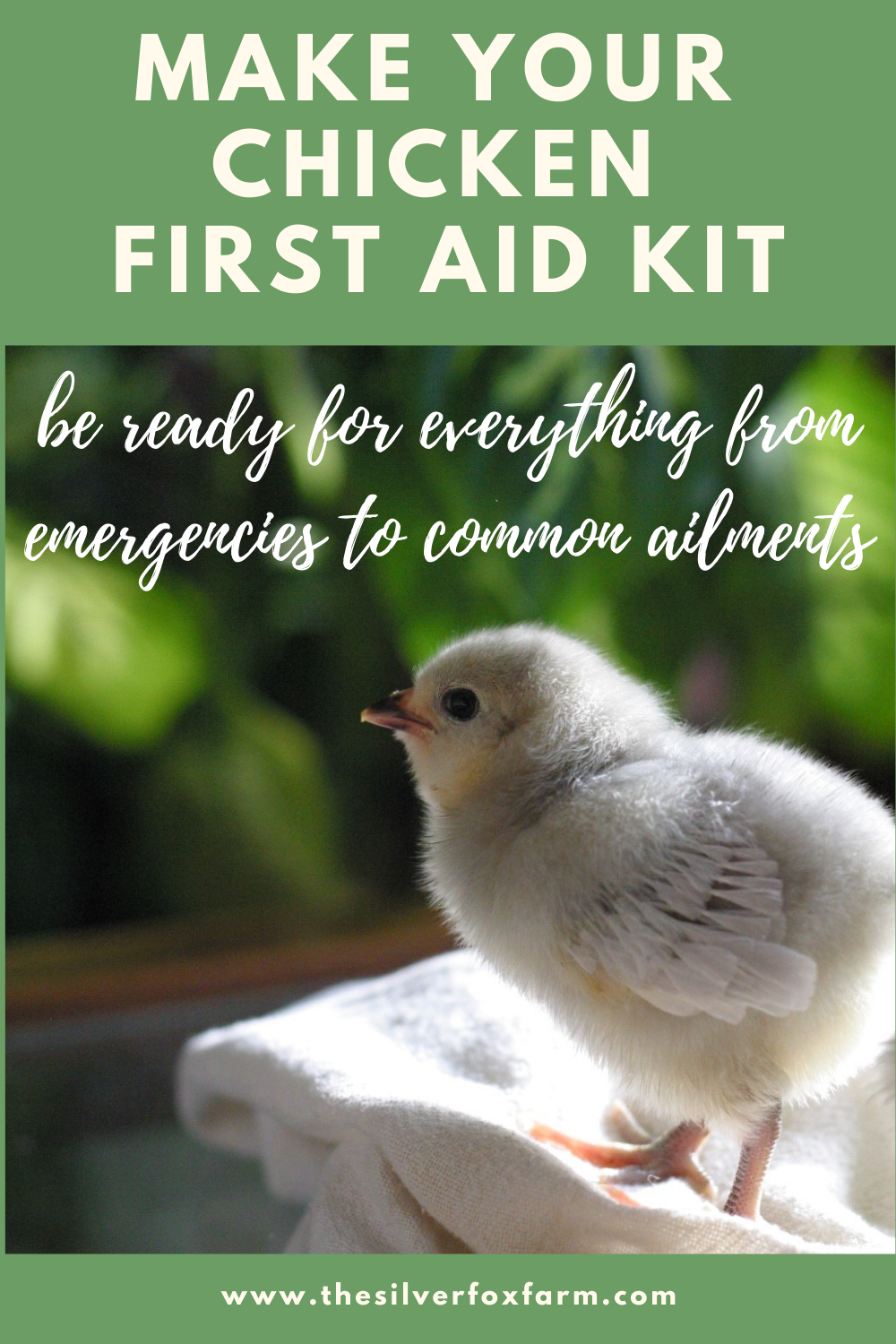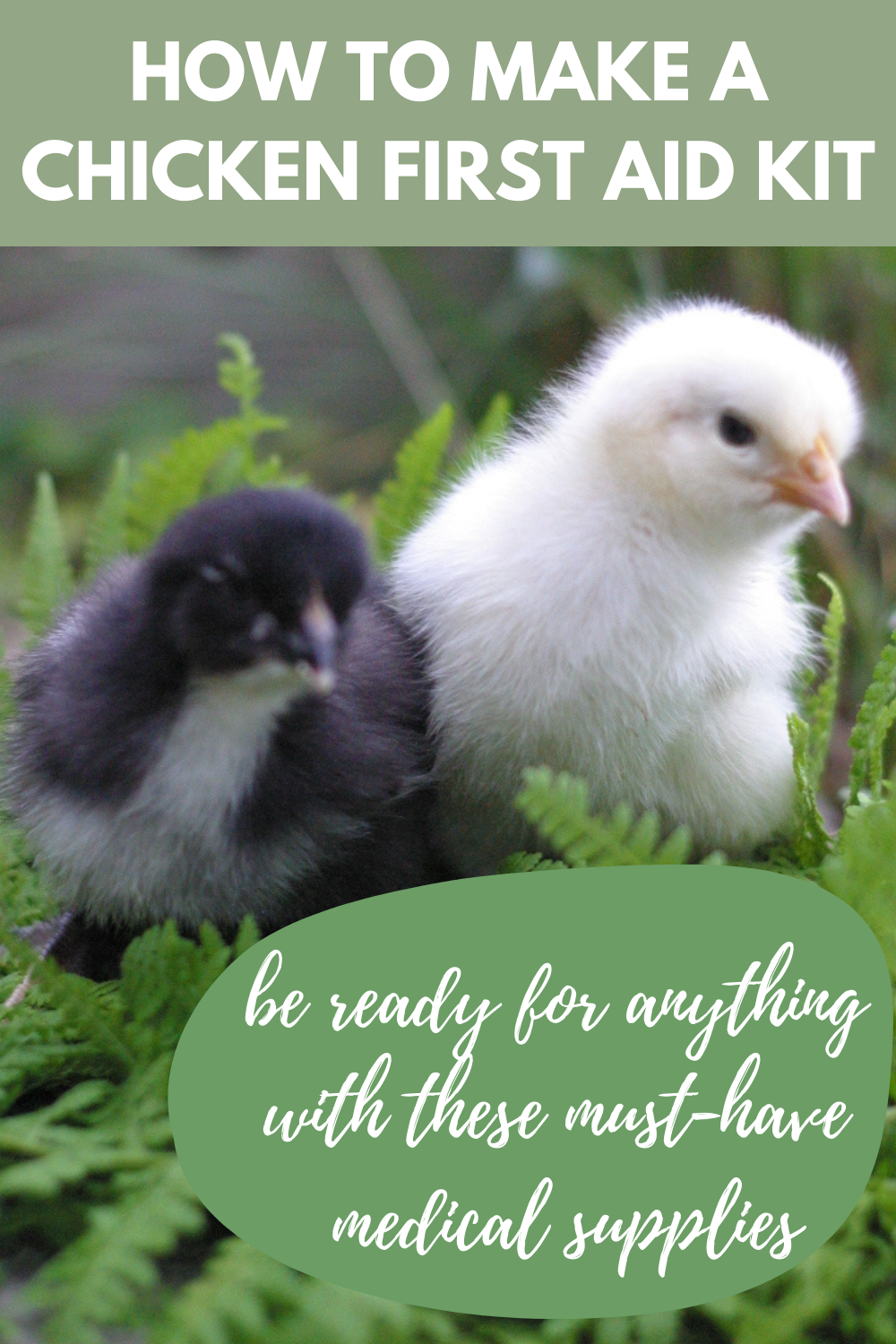|
Have you ever wondered what medical supplies you need on hand in a chicken first aid kit? You want to be ready for everything from emergencies to common ailments, but it can be hard to sort through all the supplements and medications out there to figure out what works, what doesn’t, and what you actually need. In this post, I’m going to go over everything I keep on hand to take care of our birds. Putting together a medical kit for your chickens is an investment of both time and money. I hope this peek into our medical supplies will help you save both, and be a starting point for you to put together your own chicken first aid kit. Our Experience, and a Disclaimer(Over the years that Sarah and I have kept chickens, we’ve encountered a number of health issues. When you’ve raised or hatched hundreds and hundreds of birds, injuries and illnesses are bound to happen. Since I handle the vet care on our farm, I've learned a great deal about how to treat our chickens. It’s definitely been a steep learning curve. I’ve dealt with everything from sour crop to a broken wing. Sarah and I even performed a successful crop surgery in our kitchen (that hen is still going strong two years later!). I have a lot of pride in the knowledge I’ve gained, and I’m still learning more everyday. Learning how to care for our birds medically is important to us. Some breeders or chicken keepers will hard cull (kill) at any sign of illness, and I respect how that strategy strengthens the well being of the flock as a whole. But that’s not the path we’ve chosen. If a bird has a health issue or injury, we will provide the best care possible. After recovery, that bird won’t be part of our breeding programs, but it will get a special spot in our laying flock and contribute many breakfasts to the world. For the record, I am not a vet, and nothing in this article should be construed as veterinary advice. That said, I am a farmer, and I treat my birds myself most of the time (we also have a relationship with a local avian vet who we consult as needed), so I’m happy to share my own experience and the supplies we use. While I’ll be sharing our medical tools in this post, I shy away from attempting to diagnose other people’s poultry or sharing treatment advice. While I do get these requests sometimes, I have to decline, because I'm not a vet and because it’s hard enough to diagnose a bird in person, let alone through email, and I’d hate to steer you wrong. If possible, I recommend seeking the advice of an avian vet for your chicken. I also understand that an avian vet is not always available, accessible, or affordable, so I’ll be sharing some trustworthy resources to help you diagnose and treat your bird below. Alright, let’s dive into my chicken first aid kit! (Note: I've included affiliate links to most of the products below to help you find them. We may earn a small commission at no cost to you if you purchase through these links. While I love supporting our local feed store first, I know that good local stores are not always accessible or affordable for everyone--so I offer this option, too.) Disclaimer: You must consult with a veterinarian before using the information provided in this post. I am not a veterinarian and the information contained in this post should not be seen as professional veterinary advice. If you use or rely on the information in this blog post, you do so at your own risk. Finding an Avian VetThe number of your local vet is a great thing to have on hand, although it can be challenging to find a vet that sees poultry. If you are local to Western MA, I recommend contacting Windy Hollow or South Deerfield Veterinary Clinic for avian vet care. If you are not in Western MA, you can try finding an avian vet in your area through this online directory or this directory at PoultryDVM. Chicken Health Books and Websites Diagnosing and treating chickens is tricky, for sure. Because chickens are prey animals, they have evolved to mask injury or illness from predators in order to avoid being targeted. This means that by the time you realize your chicken is unwell, it may be quite sick or hurt. Additionally, one symptom can indicate many ailments. That, combined with the fact that chickens can’t talk, and you may have trouble pinpointing what’s ailing your bird. I can’t stress this enough: When it comes to diagnosing your chickens, find a trusted and reliable source. I don’t recommend seeking advice from online poultry forums, because while you might happen across the right answer, you will just as likely find conflicting advice from people whose experience and reliability level you can’t verify. Steer clear, my friends, and consult these resources instead: The Chicken Health Handbook by Gail Damerow This book is absolutely the most valuable piece of my chicken first aid kit! Gail is a trusted source, and her book covers just about every poultry medical topic there is, along with treatment recommendations and instructions. This book has helped me puzzle out a number of medical issues in our flock. PoultryDVM I much prefer having Gail’s book in my hand, but PoultryDVM is also a great source of poultry health information. The site’s symptom checker can help you diagnose your bird, and there is responsible and trustworthy treatment info on the site, too. Definitely a great online resource. A Chicken HospitalIsolating a sick or injured bird is one of the most important things you can do to protect the rest of your flock. As soon as you notice a health issue, move the affected chicken into its own space. Once it’s settled, then you can go about diagnosing and treating your bird. Even if you suspect the issue is not communicable, it’s still a good idea to isolate your bird, just in case. Sometimes non-contagious health issues, like sour crop, can have an underlying issue that is contagious (for example, Marek’s disease can impact crop functioning). Something that might seem like an injury, such as a limp, can also be a sign of a disease like Marek’s. If your chicken isn’t feeling well, it’s a good best practice to isolate them, no matter what. Having a “chicken hospital” on hand makes it so much easier to isolate a bird quickly for the safety of your flock. Anything that can comfortably fit a chicken plus food and water will do. A metal pet crate is ideal, because it’s always ready and can be easily sanitized after use, but a large cardboard box kept on hand would work, too. Some chicken keepers install a small coop outdoors just for sick birds or new birds that need to be quarantined before joining the flock. If you go this route, just be sure to place the quarantine coop as far from the rest of your flock as possible. If you have a bird in quarantine, practice good biosecurity. Keep your patient as far as possible from other birds. Tend to them last, once your other chicken chores are done, and wash your hands and change your clothes once they are cared for. This will help prevent illness from spreading to the rest of your flock. What to Put in Your Chicken First Aid KitBasic First Aid ItemsYou’ll definitely want to keep these supplies on hand to deal with minor scrapes, cuts, sprains, and pecking injuries. Some of them have other uses that I’ll mention, too. VetWrap VetWrap is incredibly useful. It’s wonderful for treating crooked toes and splayed legs in baby chicks, especially because it only sticks to itself and not the chick’s skin. It’s also helpful to hold bandages in place after any kind of small injury or surgery. Don’t buy red VetWrap, however--your chickens will instinctively peck at it! Gauze Pads, Ace Bandages, and Medical Tape These are all helpful to dress wounds and hold bandages in place. Medical tape can also be used instead of VetWrap to treat crooked toe or splay leg. I’ve used ace bandages to set a broken wing as well (with success!). Vetericyn I use this antimicrobial spray to treat minor wounds, pecks, and scrapes that don’t require further treatment or bandaging. I also apply it daily to more intense wounds whenever I change bandages. Petroleum Jelly Petroleum Jelly has two main uses for us. We apply it to a bird’s legs and feet if we suspect scaly leg mites (raised scales are a clue!) and we also apply it to our rooster’s combs during the coldest nights of the year, to help prevent frostbite. Banixx for Chixx I bought this when Vetericyn was unavailable, as it has similar uses. Blu-Kote Chickens will instinctually peck at anything red, so any peck that draws blood (even by accident) will encourage them to keep pecking. This is stressful for the pecked bird and makes it difficult for their wounds to heal. Blu-Kote is an antiseptic spray that’s (you guessed it) blue, so it will mask the red of the wound and trick your chickens into giving up on incessantly pecking their friend. One thing to keep in mind: Blu-Kote lasts, so you won’t have to apply it often. But it also stains, so take care and aim well. It will remain on your chicken’s feathers for weeks or months, and it will stain surfaces, clothing, and your hands. If you’re not careful, you and your chicken will look like you’ve both robbed a bank! Low Dose Aspirin Low dose aspirin can come in handy to treat an injury or sprain or help keep a bird comfortable with other issues such as gout. Along with a few days of cage rest, aspirin helped me treat one of our roosters after he sprained his leg when another rooster tried to mount him. I give ½ a low dose aspirin per day to a fully grown large fowl. I would not use aspirin if I suspected any kind of internal injury. More on aspirin (including contraindications) from PoultryDVM here. Saline Spray and Liquid Iodine I keep these in our chicken medical kit to clean and disinfect wounds and surgical incisions. Antibiotic Ointment Obviously a must-have for any minor wounds or incisions. Important note: if you use an antibiotic ointment on your birds, you must make sure that it does not include a pain reliever. The most common pain relievers used in these ointments are lidocaine or other topical anesthetics in the “-caine” family. Lidocaine and all of the substances ending in “-caine” are toxic to chickens and can be immediately fatal. Antacids I keep a bottle of dissolvable antacids in case I need to treat an egg bound hen. The extra calcium can help the hen pass the egg. Thankfully, we’ve never needed it! Epsom Salts Epsom salts have saved the day for me with more than one case of bumblefoot. By soaking the affected foot in warm water with Epsom, I’ve been able to soften and remove the bumble with tweezers, no scalpel needed. So much easier for both me and my chicken. According to the Chicken Health Handbook, Epsom salt and water can also be used as a digestive flush when treating sour crop, before acidified copper sulfate is given (see below). A warm Epsom salt bath can also help an egg bound hen. MedicationsI love preventative measures and home remedies, too, but sometimes the best medicine...is literally medicine. These are a few items that have saved lives on our farm: Acidified Copper Sulfate I’ve successfully used acidified copper sulfate to treat several cases of sour crop. I know that lots of folks swear by home remedies for sour crop such as yogurt or apple cider vinegar, but in my experience these are not reliable treatments. In fact, I tried to treat our first case of sour crop with home remedies but they didn’t do the job, so I sought out this treatment instead, as recommended in The Chicken Health Handbook. Two VERY IMPORTANT things to know about acidified copper sulfate: Acidified copper sulfate is toxic in the wrong amount; it’s absolutely CRUCIAL that you dose accurately and follow the instructions carefully. It’s also important to purchase it from the right source, to be sure it’s poultry-friendly. I recommend purchasing from an online vet supply company or hatchery. Here’s one option. Sour crop should be treated quickly, so buy this ahead of time and have it on hand. Corid Coccidiosis is a parasitic infection of the intestinal tract that can kill birds quickly if not treated. Corid can be used off-label in chickens to treat coccidiosis. Coccidiosis needs fast treatment, so it’s important to keep Corid on hand so you can respond to an outbreak immediately. After a Corid treatment, your birds will need a B Vitamin supplement. Details below in the "Vitamins and Supplements" section. Antibiotics In recent years, new legislation has limited accessibility to antibiotics for poultry without a prescription. This is completely understandable given the development of antibiotic resistant strains of bacteria, but it has also made it harder for backyard chicken keepers to access these medicines. I keep a bottle of Liquamycin antibiotic and syringes on hand in case I need them. It was the only poultry antibiotic I could find online, and I plan on using it if needed for injuries or surgeries. It’s an item that I like having in my medical kit, because if I need it, I’ll want it fast. Keep in mind that some chicken ailments require antibiotics that you can only get with a prescription. It won’t work to just use whatever you can find. For example, while I don’t have any hand-on experience with this, I’ve read that some respiratory ailments are best treated with very specific antibiotics that require a prescription. If your chicken is really sick, consult a vet so that you can get the right medicine for them. Safeguard Safeguard can be used as a dewormer for poultry. It’s available in either a liquid form or a paste. The liquid form is ideal for treating a whole flock by adding it to their water, and the paste form is great for treating individuals within the flock. Some folks deworm their flock once or twice per year; we don’t do seasonal treatments but keep dewormer on hand to use if needed. Vitamin SupplementsMy favorite supplements to keep on hand are Poultry Cell, Nutridench, Durastat vitamins, and probiotics. Durastat and Poultry Cell both have B vitamins, including thiamin, so are perfect to give after a Corid treatment. Corid kills off intestinal parasites by mimicking and blocking thiamin (Vitamin B1). A vitamin supplement that includes thiamine will help boost your birds’ B1 levels after treatment. DO NOT give vitamin supplements during Corid treatment, as that would render the medicine ineffective. Probiotics are a great supplement to support the digestive system after Corid or an antibiotic treatment. I also like to add Poultry Cell to our flock’s water during times of stress, like a change in the seasons or after moving to a new coop. Nutridench can help support any newly hatched chicks that are sluggish or struggling. Other Medical SuppliesVetrx Vetrx is a mix of balsam, camphor, and essential oils. A lot of folks swear by Vetrx for respiratory support or to treat scaly leg mites, but I really can’t speak to that (personally, if our birds showed respiratory symptoms, I would consult a vet). I purchased Vetrx for our hen, Mollie, before her crop surgery, as I had read that a small drop on her nostrils could help calm her during the procedure. I can’t really speak for her, but it seemed to help. Aprons I keep a handful of chicken aprons on hand in case a bird gets overmated and begins losing any back feathers. An apron will help prevent further feather loss and injury. Chicken Diapers Yes, chicken diapers! They are a thing. I scoffed at the idea of a chicken diaper until our hen Mollie went through a long post-surgery recovery during the winter months. To keep her happy, she spent a lot of time hanging out with us in the house in her cute little diaper. They really do make having a bird in the house way easier! Syringes and Isopropyl Alcohol I have an assortment of syringes for injecting the Marek’s vaccine, or any other injectable medicine, along with isopropyl alcohol and cotton balls to disinfect the injection site. We also have some large plastic needleless syringes for measuring supplements or medicines that are given orally. Important note: When giving medicine orally this way, never force or squirt a large amount of liquid down a chicken’s throat. They could asphyxiate. Use the plastic syringe to slowly give them the liquid a few drops at a time. BioFreeze If you are in a situation where you need a topical anesthetic for your bird (such as surgery), use BioFreeze. It does not contain lidocaine or similar substances. You should be able to find it at your local pharmacy. Castile Soap and Potassium Sorbate Powder In the past, we’ve used a mix of no-fragrance castile soap, food grade potassium sorbate powder, and water to create a spray to treat lice and mites when dust bathing wasn’t enough. Thank you, Kelsey Jorissen, for giving us this idea. Measuring spoons, measuring cups, and scissors I purchased each of these for a dollar to keep on hand in our medical kit. So worth it. 10/10 recommend not using your wife’s baking and kitchen tools to do vet care! Thermometer While as of this writing I have not needed to vent-temp a chicken, I will be ready when the time comes--and I am grateful I’ll have a chicken-only thermometer at the ready. Sutures When we performed crop surgery on Mollie, I was unable to source sutures anywhere but online, and I knew she needed treatment before they would arrive in the mail. Fortunately, Gail Damerow’s Chicken Health Handbook offers suture-free instructions for this surgery, which worked perfectly. However, if I were to do this surgery again, I would definitely try using sutures instead, and I'm glad I have them for surgery or an injury. Scalpel Set Kind of hardcore, right? I love my little scalpel set, but a sharp Exacto knife would do the job of this set, too. My scalpel came in handy when we performed crop surgery on our hen, Mollie. It’s also useful for treating bumblefoot if surgery is needed, and I’ve used it when doing at-home necropsies as well. What Are the Most Important Items to Have in Your Chicken First Aid Kit?
I completely understand if it would feel like overkill for you to go out and purchase ALL of these things! It’s taken years for us to gather these items, some just to have in an emergency, some because we needed them, and some because we thought we needed them, but were wrong! I think the most important items to have in your chicken first aid kit are things that are hard to find locally or that you’ll need in an emergency. You don’t want to wind up in a situation where you are waiting for something crucial to come in the mail, with your chicken’s life hanging in the balance. And even if you live next door to a Tractor Supply, what if they are out of Corid the day your flock has a coccidiosis outbreak? It’s good to be prepared. Based on that, here are the top things I recommend having in your chicken first aid kit:
This kit will cost about $100, but you may already have some of these things on hand. Either way, if you can swing it, it’s a worthy investment that will prepare you for most (if not all) of the chicken medical scenarios you’ll encounter. I hope you found this tour of my chicken medical supplies helpful. Do you have any questions? Have I missed anything that’s a must-have for your chicken first aid kit? Let me know in the comments below!
7 Comments
8/27/2022 08:08:33 am
It's great to see that we still have people who care about chickens, and provide their first aid products.
Reply
4/30/2023 06:22:08 pm
Awesome! Thank you for providing this important information. I strongly advise you to visit this site in order to learn more about Food and Beverage.
Reply
Jade
5/23/2023 07:21:36 pm
Love love love! My Amazon cart is FULL. Great knowledge!!
Reply
Bill Klug
8/23/2023 11:21:43 pm
Hey
Reply
2/4/2024 10:12:05 pm
I can tell that your website is incredibly educational, and each post is superior to the blog and articles on any other website. There is more information on your blog than any other. You are undoubtedly one of the most informative article writers, in my opinion. Somehow, I came onto another educational blog with similar content to yours. You can visit the website farmingplan.com to learn more about farming.
Reply
Attention, pet parents! Picture this: a playful romp in the park turns into a pet emergency. Would you know what to do? In our latest blog post, 'Pet 911: Fundamental First Aid For Pet Owners Must Know,' we're unleashing the ultimate guide to pet safety and well-being. From decoding common ailments to mastering life-saving techniques, this is your go-to resource for keeping your furry companions happy, healthy, and out of harm's way. So, don't wait for a wagging tail to turn into a worrisome situation – join us as we empower pet owners everywhere to become true pet heroes!
Reply
Leave a Reply. |
Hi, I'm Maeg.Welcome to our blog! Categories
All
|
©
The Silver Fox Farm

